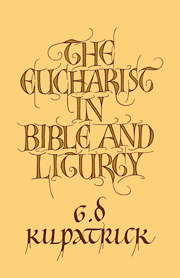Lecture V
The nature of the Eucharist: (2) the sacred meal
Published online by Cambridge University Press: 29 September 2009
Summary
The nature of the Eucharist: (2) the sacred meal
In the last lecture I concluded that in the New Testament the Eucharist was a sacrifice in Biblical terms. This was my answer to the question: is the Eucharist a sacrifice? But this question is part of a larger one: what is the Eucharist? I shall now suggest that we have to supplement our conclusion from other evidence.
You will remember that when I was looking at the theme of the food of immortality I mentioned the romance, Joseph and Asenath (= JA) as providing evidence that the expression ‘bread of life’ is older than and independent of John. You may have felt that I introduced this romance with too little explanation. I shall now try to make this good.
When I was considering Jeremias' interpretation of the Last Supper some twenty-five years ago, it was clear to me that it was not enough to point out the weaknesses I detected in his argument. I had to produce a convincing alternative. I must show not only that the Last Supper was not a Passover but also that it was something else.
At that time I was working on Jewish literature between the Old and New Testaments, especially as it existed in Greek. In the course of these studies I came across the romance of JA and I saw at once that it had been quite misunderstood. Batiffol the nineteenth-century editor had presented it as an eccentric Christian text of the fourth century a.d.
- Type
- Chapter
- Information
- The Eucharist in Bible and Liturgy , pp. 59 - 68Publisher: Cambridge University PressPrint publication year: 1984

